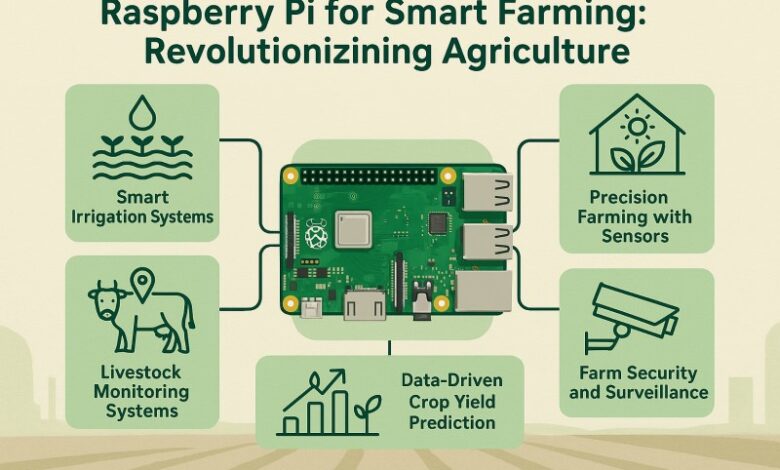Raspberry Pi for Smart Farming: Revolutionizing Agriculture

In the UAE, where agriculture faces the challenges of extreme weather and limited natural resources, innovative technologies like Raspberry Pi smart farming are transforming the farming landscape. This compact, cost-effective device enables farmers to adopt innovative farming and precision agriculture techniques that improve efficiency, reduce resource consumption, and increase productivity. Here’s how Raspberry Pi is revolutionizing agriculture in the UAE.
1. Smart Irrigation Systems
Water scarcity is one of the biggest challenges in the UAE’s agricultural sector. Raspberry Pi is playing a crucial role in the development of smart irrigation systems. By connecting IoT sensors to a Raspberry Pi board, farmers can monitor soil moisture levels and automatically adjust irrigation schedules to ensure crops receive optimal water. This reduces water wastage and improves crop yields.
Benefits:
- Efficient water usage.
- Cost savings on water bills.
- Ensures optimal hydration for crops.
2. Precision Farming with Sensors
Precision farming involves using data to optimize crop management. Raspberry Pi helps farmers monitor environmental factors like soil temperature, humidity, and nutrient levels. By collecting and analyzing this data, farmers can make informed decisions on irrigation, fertilization, and pest control, reducing the use of resources like water and fertilizers.
Benefits:
- Increased crop productivity.
- Reduced input costs (water, fertilizers).
- Better resource management.
3. Automated Greenhouses
Greenhouses are commonly used in the UAE to grow crops in a controlled environment. Raspberry Pi can automate greenhouse operations, such as regulating temperature, humidity, and lighting. By connecting sensors and control systems to Raspberry Pi, farmers can maintain optimal conditions for crops, ensuring they grow efficiently while saving on labor costs.
Benefits:
- Energy efficiency through automated climate control.
- Labor cost reduction.
- Improved crop quality.
4. Livestock Monitoring Systems
Raspberry Pi is also revolutionizing livestock farming. By using sensors like heart rate monitors and GPS trackers, farmers can track the health, location, and activity of their animals. This data allows farmers to monitor livestock health in real-time and take quick action if any animal shows signs of illness or distress.
Benefits:
- Early detection of health issues.
- Improved livestock productivity.
- Real-time monitoring of animals.
5. Farm Security and Surveillance
Farm security is crucial to protect crops and equipment. Raspberry Pi can help set up surveillance systems with cameras and motion detectors. Farmers can remotely monitor their farms and receive real-time alerts in case of any unusual activity.
Benefits:
- Enhanced security of the farm.
- Remote monitoring of farm premises.
- Peace of mind for farmers.
6. Data-Driven Crop Yield Prediction
Predicting crop yields is vital for effective farm management. Raspberry Pi collects data from soil sensors, weather conditions, and crop health, which can be analyzed to predict crop yields. This helps farmers plan their harvest, reduce waste, and ensure they meet market demands.
Benefits:
- Accurate crop yield predictions.
- Better planning for harvest and sales.
- Reduced risk of overproduction.
Conclusion
Raspberry Pi is enabling smart farming solutions that improve sustainability, productivity, and efficiency in the UAE’s agricultural sector. Whether through smart irrigation, precision farming, automated greenhouses, or livestock monitoring, this affordable and versatile technology is transforming the way farms operate. With its ability to streamline processes and optimize resource use, Raspberry Pi is a game-changer for the future of farming in the UAE.



